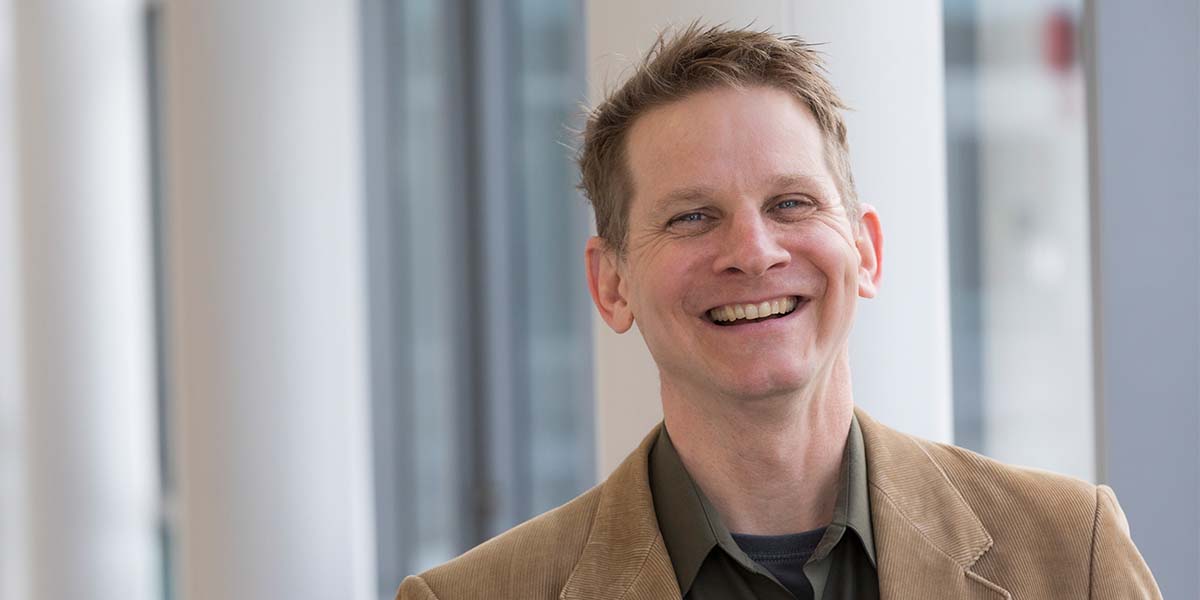Professor’s contributions studying how political, cultural issues affect schools leads to academic award
Adam Laats of the Department of Teaching, Learning and Educational Leadership won the 2022 Lois B. DeFleur Faculty Prize for Academic Achievement

When it comes to understanding cultural and political issues affecting schools, Adam Laats of Binghamton University’s Department of Teaching, Learning and Educational Leadership (TLEL) begins by looking to the past.
That can sometimes mean looking back as far as a century for historical context to better understand complex issues students and teachers are facing today.
Laats’ contributions to the evolving conversations surrounding education have earned him the 2022 Lois B. DeFleur Faculty Prize for Academic Achievement. Announced June 8, the award is handed out for accomplishments that increase the University’s reputation for excellence, innovation and collaborative endeavors.
“I love this school and I’m happy to contribute as much as I can,” said Laats, a professor in TLEL whose research interests include the history of American education and cultural battles over schooling and school reform.
Laats has lent his expertise in books and contributed articles in news outlets and other publications nationwide, touching on such significant topics as problems raised by the pandemic in schools, drawing parallels between the debate over race theory and past teaching of evolution in classrooms, even discussion of flaring tempers at school board meetings.
One of the aspects of education that especially draws Laats’ interest is how schools should approach teaching topics that Americans generally have strong disagreements over, yet mostly agree that students should learn in some way.
Laats points to historical or present-day topics that have often stirred debates: the dropping of the atomic bomb, the Vietnam War or the Black Lives Matter movement. Topics like these can cause debate about whether one decision or point of view is right or wrong, he said, and schools can sometimes be challenged by how to effectively convey that complexity to students.
“What do we tell them about history? What do we tell them about sexuality? What do we tell them about who they are and why that statue is in their downtown? Those are questions schools must figure out how to answer, and there’s competing theories as to how,” Laats said. “Students need to know about some pretty uncomfortable truths, but it’s also important for them to have trustworthy information.”
Laats’ body of work, especially the 2022 academic achievement award, have earned high praise from colleagues.
“Adam’s work is insightful, timely and well-researched,” said Matthew McConn, TLEL department chair. “This is a well-deserved award.”
In a letter announcing his award, the review committee noted Laats’ “excellent and insightful” books and journal articles, as well as his frequent invitations to serve as key speaker for annual conferences hosted by prestigious associations in his field. The committee also noted his Outstanding Book Award from the Education History Society for The Other School Reformers: Conservative Activism and American Education.
Laats’ research into education history isn’t limited to topics that can stir debate in classrooms. A “nerdy hobby,” as he calls it, has long been collecting and studying old U.S. history textbooks.
One of those is a textbook from 1898. It describes “real Americans” in a very specific way, he said, and that’s the story kids were told at the time regardless of their nationality, racial or ethnic demographic. Today’s textbooks are filled with many more pages and have expanded into a diverse perspective of the world, he said, but they’re still not all ideal.
Laats sees this as a parallel of sorts for the ongoing work that needs to ensure students are learning everything they need to learn in school, to become better educated about the context of the world around them.
“Let’s assume students are going to disagree about these issues, but they need to learn how to think about these issues,” Laats said. “They need to learn how to find trustworthy information, how to back up their ideas with reliable evidence. Schools have been doing that for a long time. Parents want it. Teachers want to do it. And most American kids want to learn it.”
